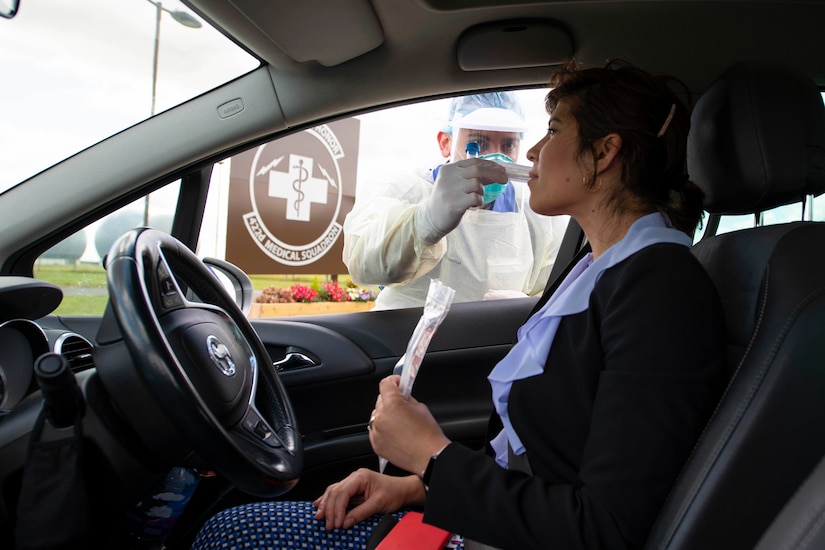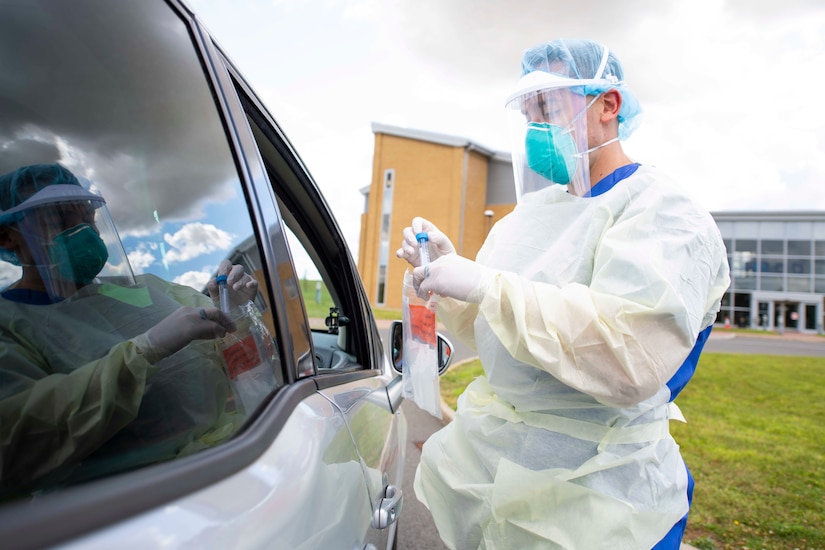Air Force Tech. Sgt. Steve Zavala, 422nd Medical Squadron medical operations flight chief and Trusted Care champion, along with three other medical technicians, have been testing patients for COVID-19 at the 422nd MDS using the same testing procedure used for the seasonal flu.
''The particular method to collect the COVID-19 swabs is called the nasopharyngeal swab,'' Zavala said. ''The training that we received is dictated down from [the Defense Health Agency]. The DOD Global Respiratory Pathogen Surveillance questionnaire lays out, step by step, how to do a nasopharyngeal swab.''
The questionnaire said that one of the steps when collecting a sample was to have patients blow their nose into a tissue. However, while watching COVID-19 testing on the news, Zavala noticed other medical professionals were not having their patients blow their noses before collecting samples.

''I was pretty confident we were doing something wrong here — something just didn't seem right to me.'' Zavala said. ''I did some research and finally came across a step-by-step guideline according to the [Centers for Disease Control and Prevention] on what you should do for nasopharyngeal swabs.''
Zavala noticed that the CDC procedures had no recommendation that patients have to blow their noses. He then searched the Air Force Medical Service Knowledge Exchange COVID-19 page and didn't find that recommendation.
''There’s this big push for medical Trusted Care, not only in the Air Force, but across DOD,'' Zavala said. ''We're trying to mirror the reliability that the nuclear industry and commercial aircraft have. ... Medical has been trying to adopt the principles that those industries have, and we call it Trusted Care.''
Trusted Care is not a program, but a type of culture focused on improved communication, he explained.
''It took us three years to get to the point where we're starting to see some of the positives from doing all of the Trusted Care work,'' Zavala said. ''Every department has their own daily huddle. That's the time to bring up any safety concerns — it's all safety driven. Every meeting that we have starts with safety moments and safety stories.

''It's hard for people sometimes,'' he continued. ''They just fix things on the fly — they don't think of things as a safety moment. The way that people learn the best is from stories. It's to get people to look at things in a different way, and maybe it will trigger that story in their mind when they see something else. In a hospital, anyone can find something that can be a huge issue.''
A Situation, Background, Assessment, Recommendation report is part of Trusted Care. It's a technique used in health care to facilitate communicating recommendations to improve patient care. ''You're recommending an action be taken,'' Zavala said. ''You're not just complaining about something wrong, but you're recommending up to the highest levels.''
Zavala sent a SBAR report to his leadership, explained the situation and asked for clearer guidance on testing procedures to have more accurate results. They sent the SBAR, and the recommendations to discontinue nose-blowing, to the U.S. Air Forces in Europe Trusted Care regional and head laboratories. From there, the report gained Air Force-level attention.
''The form that is DOD-wide is going to be changed to match the CDC,'' Zavala said.
Zavala shared some suggestions from his experience.
''Speak up if you see something that doesn't jibe with what you've been taught,'' he said. ''A big thing in Trusted Care is to exercise a questioning attitude. It's always good to ask people for a crosscheck — 'Hey, does this seem right to you?' It ties into our core value of excellence in all we do. Why are we taking the time to do this, if you feel it’s not the best method?''
(Air Force Airman 1st Class Jennifer Zima is assigned to the 501st Combat Support Wing.)








No comments:
Post a Comment